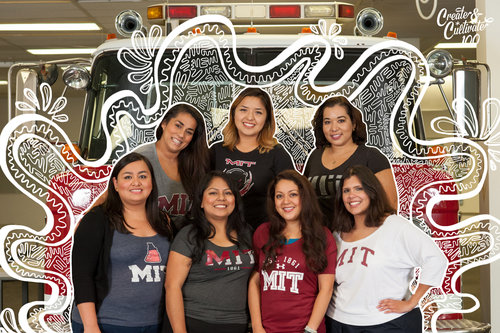Create & Cultivate 100: Entrepreneur: Soraya Darabi
THE TRAIL BLAZER.
THE TRAIL BLAZER.
Soraya Darabi is the kind of Cover Girl every young woman should aspire to be.
She covered Fast Company’s “Most Creative People in Business” issue, then showed up on Inc. Magazine’s “30 Under 30” list in 2012, only to land on Fortune’s “40 under 40” list three years later.
Her business train moves as fast as her brain and as such, some have dubbed her a serial entrepreneur. But that doesn't bother Soraya-- not in the slightest. She began her career as the Digital Marketing and Social Media Manager at The New York Times at 23. She moved into entrepreneurship with the launch of Foodspotting, which she co-founded in 2011 and was acquired by OpenTable for $10 million, and then Zady, anti-fast-fashion e-commerce destination described as "The Whole Foods of fashion," in 2013.
Through all of her ventures she's never glamorized startup life.
Rather, she's crystal clear on the romanticized version of startup life the media likes to play up. She says entrepreneurs need to be stern if they want to see their idea succeed. At present, she's General Partner and founder at New York-based venture firm, Trail Mix, which invests in "the future of living well.” Investments include The Wing and Parsley Health.
More from Soraya below.
Name: Soraya Darabi
Instagram Handle: @soraya
Business Instagram Handle: @trailmixvc
We think hybrid models in all areas of business are the future. As someone who has been voted "most creative" by Fast Company. What does it mean to be "creative" in business?
To be creative in business you have to live in both the present and the future. In the present you should create an environment for yourself, whether you work for yourself or a company, that is your own personal culture. Imagine starting a business from scratch and writing a memo that at first only you can read, called "MY COMPANY CULTURE." What would go on that memo? Personally, I would write down words like flexibility, reflection, movement, excitement, dynamic conversations, brainstorming, imagining, gut-instinct. These are words that guide how I operate in business, but the words may be very different for you. Creativity is about inventing a system for yourself, that ultimately allows you to flourish within a larger construct.
What would you say has been the through-line of companies that you've founded and invested in?
Honestly, I'm not sure there is a tight soundbite or perfect through-line of the companies I've worked for, founded or invested in. Generally speaking I am drawn to work whereby I can learn from a mentor or colleagues, when the work is purpose-driven and design driven. I like pushing the envelope of what is expected in business and in life, and I believe the companies I align closely with - especially now at TMV - are edgy and bold. Beyond that, my mother the professor, always reminded me growing up that people change professions frequently. College students change their majors at least 2 times on average. Change is a word we embraced in my household because change leads to growth. Now, as an investor, I gravitate toward founders who relish in the new and push boundaries.
"Change is a word we embraced in my household because change leads to growth."
Tweet this.
For our reader, she's young, entrepreneurial, but at times fearful of the next step. As someone who has shifted roles and founded new businesses, how have you decided when it's time to step down and/or move on?
There is absolutely nothing more terrifying than leaving a role. It takes conviction, thoughtfulness, and time to make that plunge. I suggest before making a move formally, to ask a few friends to join your 'personal board' and to meet with them once a week or once a month to help prepare you for that next step with a detailed plan that you can be held accountable to. Love and support is the best way to get out of a rough professional patch and into the clear.
How do you feel about the characterization of "serial entrepreneur?"
I don't mind it, I think entrepreneurs who begin many companies are eager to make a dent in the world. It's an earnest desire to build a business with lasting impact. I would rather be known as a serial entrepreneur than Sally from HR.
What are the common challenges you've seen among female business owners and entrepreneurs?
I see women in business having difficulty pitching their idea and their mission effectively, economically and confidently. Once I feel like I am a black belt in pitching myself (Im not!) I would like to offer free coaching for women entrepreneurs specific to public speaking and presenting. I'm not alone in wanting to help women in this way. The newly launched Female Founder Office Hours will be a great way for women to practice their pitch in front of some of the most senior women in venture in a supportive environment with the goal of helping them present beautifully to the outside world.
With Trail Mix Ventures what was the turning point that convinced you, it's time to take matters into my own hands?
I knew that incredible companies in New York and Los Angeles were being overlooked by venture capitalists and saw that as an opportunity to launch my own fund to invest smartly, and sincerely, in purposeful businesses. That's it.
Where do your drive and passion come from?
I am a child of an immigrant. My passion comes from the pursuit of the American Dream.
"I am a child of an immigrant. My passion comes from the pursuit of the American Dream."
Tweet this.
When you run into a career obstacle, what drives you forward?
A night out with my friends who put work into perspective and remind me to let loose and to have some fun. Dancing drives me forward.
What is your biggest pet peeve?
Unanswered emails and texts.
What are your biggest fears about running a business?
I'd rather answer that question with this quote: "'You gain strength, courage, and confidence by every experience in which you really stop to look fear in the face. You must do the thing which you think you cannot do." - Eleanor Roosevelt
What's something you'd like people to know about your job that they probably don’t?
Investing isn't only for MBAs and left-brained. My line of work is both creative and intuitive, and some of the best investors in silicon valley began as journalists (as I did) because of their innate curiosity and love of truth. So if you feel like a futurist and you want to be on the pulse of what is next, please consider a job in venture.
Every day there is someone in your shadow. How can we stay original when we are so saturated by other people's work?
I think you get momentum from competition but keep your eye on the prize and stay focused and calm. That's all any of us can do. That, and, deleting Facebook from our smart phones.
What about your career makes you feel the most complete?
I feel complete in my career when I push myself - or our team pushes itself - to a finish line we never thought we would get to. I feel complete when I learn and then master a new skill (like pitching institutional LPs). It feels wonderful to be in a position to learn new things on a daily basis.
If you had to trade jobs with anyone else in the world, who would it be and why?
I would trade jobs with a popular playwright. As a teenager I wrote plays in my downtown and once had a play quasi-produced. It is a great hope that I will go back to those early works and workshop them to life again, with an adult vocabulary and prospective. So I think I would trade jobs with Neil Simon.
At what point in your career did you find the confidence to really take charge and become the woman you are today?
The woman I am today is purely because of my Grandmother, Elizabeth Fennelly, a great early influence, a true philanthropist and a very kind soul, and my brilliant mother, Katherine Fennelly, who raised my sister and me on her own terms while pursuing work that was not only meaningful to her but to the world. I think without them supporting my dreams and ambitions I would be without the confidence and resilience I have at this moment in life.
What's the best advice you've ever been given? Or your favorite piece of #realtalk?
Just to remember breathe and sleep. My mother always says "Everything will be better in the morning, but only if you've had a good night's sleep."
What song do you sing in the shower when you’ve had a bad day?
After a bad day, If I'm in the mood to sing, I would go with Everybody Hurts by REM.
TO SEE THE FULL CREATE & CULTIVATE ENTREPRENEUR LIST CLICK HERE.
Bumble Queen Whitney Wolfe's Best Real Talk Advice
Plus, 7 other women give us the truth on National STEM Day.
Written by: Tyeal Howell
Nearly all of the fastest growing occupations in the U.S. are within the STEM/STEAM industries. The gender gap in these industries is unreal. #NationalSTEMDay was created to celebrate, inspire and encourage the younger generation to explore their interests in the Science, Technology, Engineering, Art and Math fields. To join the celebration, we talked with 8 Women in STEM to get the best “real talk” advice they’ve ever received:
Stay humble.
Know that your career path and your goals may change over time, but stay true to yourself along the way. - Latinas in STEM
Your close crew matters.
“Who you hang out with determines what you dream about and what you collide with. And the collisions and the dreams lead to your changes. And the changes are what you become. Change the outcome by changing your circle.” -- Seth Godin - Claire Burke
Breathe.
Take a deep breath and move on! You will realize that you are a lot stronger than you think. - Leura Fine
Honestly, be authentic.
Answer honestly, support authentically, share resources and share other women's work. - Heather Lipner
Get thick skin.
The bigger the risk, the more likely the failure. You have to develop thick skin if you want to accomplish a lot in life. - Rachel Tipograph
Celebrate the small wins.
I've tried to actively start celebrating small milestones and successes, since I know that I'm really bad at recognizing how far we've come as a company. - Aarthi Ramamurthy
"A successful career is earned and requires sacrifice."
Tweet this.
A successful career is earned and requires sacrifice. It truly is done through dedication and a lot of hard work, nothing is handed to you. - Melissa Grillo
Don't sweat it.
Snap out of it! It always looks better in the morning. - Whitney Wolfe
What other women in STEM are you inspired by today? Comment below!
MORE FROM OUR BLOG
Startup 101: How to Build Brand Trust from Scratch
Started from the bottom. Now... what?
I was inspired to talk about how to engage potential customers and build trust after a recent search on LinkedIn. I was searching for a sales funnel and email marketing specialist, and I came across several people who claimed to be consultants or specialists for hire. When I wanted to learn more, I couldn’t find anything about them online. No reviews, no website, and no information about why or how someone could hire them. This is an immediate red flag for me, but when I thought more about it, I realized that maybe people just don’t know how to engage potential customers and build trust.
As a personal branding expert, I often discuss why it’s important to cultivate a personal brand and optimize platforms like LinkedIn, so I was astounded that so many people who want to be hired as a consultant or expert don’t know how to create an online footprint. If you do not know how to maximize your online footprint, you are hurting your career and losing business. When you’re not a heritage brand, your online footprint is even more important when you’re trying to engage potential customers and build trust.
Optimize your LinkedIn profile
This is the first step of engaging potential customers. If you’re not on LinkedIn currently, create an account now. This is one of the most widely used platforms in career development, so underutilizing LinkedIn could be detrimental for your career. You’ll want to make sure your profile is fully optimized, but on top of that, make sure that your contact information is prominent, especially if you’re interested in getting hired for your services.
"If you don't know how to maximize your online footprint, you're hurting your career and losing business."
Tweet this.
Highlighting your expertise and how you can help others is also one of the most important aspects of engaging potential customers. Show examples of your work and your professional achievements to show potential customers exactly what you can do for them.
If you are offering professional services and are a registered business, create a company page on LinkedIn where people can learn more about your business and see that it is legitimate. Creating a company page on a trusted platform like LinkedIn helps build trust in your own brand.
Demonstrate a professional brand
If you’re offering professional services, you’ll want to demonstrate a professional brand that’s consistent across all channels. This means creating uniform content and being present on a company website, LinkedIn, Google, Yelp, and social media. The more channels and social platforms you utilize, the more reputable and trustworthy your brand becomes. If someone is unable to find a source of your work, including examples, contact information, and recognition, they’re unlikely to trust you as a brand and a professional. If you can’t establish trust among consumers, you won’t have a successful business.
Utilize referral marketing
Referrals, recommendations, and testimonials are a huge part of building online trust and maximizing your online footprint. When a trusted friend tells you about a business, you transfer that trust to the company. Use LinkedIn recommendations, Yelp reviews, and customer testimonials on your website to help build trust and highlight your achievements. If real customers can attest to your quality of work and what you have accomplished for them, you will be able to establish yourself as a reputable resource.
As a side note, building up your presence on sites like Yelp will immensely help you because consumers trust that you cannot buy good reviews on that platform. Yelp uses algorithms which test and verify the reviews before posting them, which creates another level of consumer trust. When you’re using a trusted platform, it can appear more legitimate than simply writing down a customer testimonial with no verification.
Cultivate a consistent personal brand across channels
Creating a cohesive personal brand is extremely important for developing your career, and using consistent branding across channels helps build your credibility. Think about it this way: If you search for a person or business and see multiple platforms and channels come up with the same information and visuals, you can assume that this brand has put in the time to create a consistent branding strategy. If you see different visuals, as well as inconsistent verbiage and service offerings across platforms, it’s harder to believe that the brand is professional and trustworthy.
________________
When considering how to optimize your online footprint, you want to focus on a few main factors:
- Providing resources such as contact information and examples of work
- Creating a consistent brand across channels
- Creating trust through reviews and testimonials to establish yourself as a reputable source of work
The more information about yourself as a business professional you can put out there, the more trusted you will become. Note that this is not personal information, but information about business like business contact information, business information, services offered, etc.
A native San Franciscan, Michele Lando is a Certified Professional Resume Writer and founder of writestylesonline.com. She has a passion for helping others present the best version of themselves, both on paper and in person, and works to polish individuals' application package and personal style. Aiming to help create a perfect personal branding package, Write Styles presents tips to enhance your resume, style, and boost your confidence.
MORE FROM OUR BLOG
The 7 Culture Mistakes Startups Always Make
Consider this your list of don'ts.
photo credit: Molly Winters
Every founder knows that culture is crucial to a startup’s success — as Fred Wilson says, “If you want to be in business forever, you need to build a culture that sustains the business” — but there are seven common mistakes that startups make when creating their culture:
1. YOU THINK CULTURE JUST "HAPPENS"
Running a startup means your burn rate is always in the forefront of your mind, and as a result, everything takes a backseat to getting to MVP. Culture can be fixed later, right? The truth is that “culture” is just another way of saying “how we work here,” and by the time you get to your MVP, it will be deeply entrenched.
FiveStars’s founder Victor Ho never took the time to officially define the culture— he felt it was too “cheesy”. But as they grew from 40 to 80 employees, their culture got diluted and as people clashed over ways of getting work done. As quoted in Fast Company, Ho described it as “one of the hardest periods of the company.” Rather than waiting to define your culture, consciously shape your culture while you build your MVP. You don’t have to go on an expensive company retreat, or write an elaborate culture deck. It can be as simple as writing down five words that describe your culture and once a month, as a team, discussing whether they’re still appropriate.
2. YOU ONLY HIRE YOUR FRIENDS
Hiring for a startup requires a high level of trust: you need your team to work hard and make the right decisions, and the team has to believe in you and your vision. So it’s only natural to look for people from your existing network. This can be useful at first — homogenous teams communicate better and demonstrate greater cohesion — but can quickly lead to trouble.
Hyperloop One was launched with great fanfare, but was hit with a lawsuit due to (among other things) the co-founder hiring his brother as general counsel, and dating their PR consultant, whose fees then nearly tripled. Avoid this by establishing the rules of engagement early on, including what happens in a worst-case scenario (such as firing your friend). You should also think about how you’re going to integrate people into the existing culture; your goal is to prevent cliques from forming or for people to feel excluded from an “inner circle.”
3. YOU THINK HIRING MORE PEOPLE MEANS SUCCESS.
Celebrating is so important because success at a startup can be so rare in the first months. It’s comforting to be able to point something that’s a clear sign it’s all working. And as Buffer’s founder noted, “Team size is easy to understand. Sometimes it impressed people when I told them how big the company was, and I was proud to share it.” But the company brought on too many people, too fast, and was forced to lay off 11% of the company. Protect team morale by tracking more accurate measures of success, and find ways to celebrate small wins regularly.
4. YOU SPEND TOO MUCH $$ ON PERKS TO COMPETE WITH OTHER STARTUPS
Bribing employees is a common Silicon Valley practice — what else are meals by gourmet chefs, meditation classes, and laundry service but attempts to get more work out of employees? And those bribes don’t come cheap: shrinking VC funds forced Dropbox to cancel its free shuttle and and limit free meals.
If you really want your team to do their best work, regardless of your compensation budget, give them meaningful work. Show them how their work is directly impacting the organization, and how the organization is making a difference in the world. In other words, give them purpose. Oh, and don’t worry — “purpose” doesn’t necessarily have to be a product or service that saves the world (though that’s a plus); it just means that you have a compelling vision and mission.
5. YOU OVERWORK PEOPLE IN PURSUIT OF THE PRODUCT.
Signing up for a startup is a commitment; long hours and outrageous goals are part of the bargain. But push too hard, and you’ll flare out. At Zynga, for instance, long hours, “aggressive” deadlines, and an obsession with performance metrics led to a talent drain, and even hampered its ability to acquire companies. To prevent burnout, hold regular check-ins with your team to help them manage workload and stress levels. And don’t forget to check-in with the founder: 30% of founders report being depressed, as opposed to only 7% of the general population.
Again, we’re not saying you won’t spend some long nights and weekends at this office, but don’t make it a cultural norm.
6. YOU DON'T FIRE JERKS BECAUSE THEY'RE SMART.
Hiring the best talent is highly competitive, but ignore the “no asshole” rule at your own peril. Despite their superior skill set, their personality will destroy your team culture, not to mention their productivity. In one of our engagements, we worked with an executive whose attitude turned the rest of the team against him. This led him to protect his own job by guarding his data more and more closely, leaving the startup completely in the dark when making crucial decisions. Still not convinced? Jump to 4:30 to hear Paul Graham, founder of YCombinator, talk about his “no asshole” rule.
The best way to avoid this problem is to carefully screen for jerks during the interview process, listening for self-centered answers and trash talking past employers. (As Raylan Givens of Justified noted, “If you run into an asshole in the morning, you ran into an asshole. If you run into assholes all day, you’re the asshole.”) But if one has slipped past your radar, talk to them and make it clear how you expect their behavior to change. If they don’t shape up, then it’s time to go your separate ways — the rest of the team will thank you.
7. YOU BELIEVE THE RULES DON'T APPLY TO YOU.
Pushing the limits is a great way to get new customers and attract attention… until it isn’t. Zenefits was lauded as a major disruptor in the insurance industry, and its investors pushed it to increase its sales goals. Unfortunately, to meet those goals, the company ignored state regulations — which ultimately threatened to destroy the organization and forced the CEO out.
Before you even think about lawyering up, sit down with your founders and determine your company values. What’s most important to your team? When might you need to debate an action before moving forward? Check in every quarter so that when money’s on the line and deadlines approaching, you know what you stand for.
Written by: Paula Cizek, Director of Knowledge & Editorial at NOBL. NOBL is an organizational and team design consultancy that unleashes the creativity and capability of teams through new ways of working. Sign-up for one their upcoming team design bootcamps.























